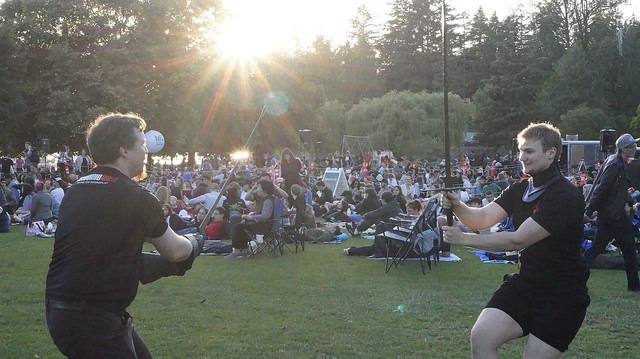There are many types of partners you could end up sparring with. For example, if you had a sparring partner who always, consistently, threw cuts right as you stepped into their measure and stopped when you stepped out, then you could know that you could always go to them to practice your parries.
Or, if you had a sparring partner who always kept their point on-line, was very quick to disengage, sought control, but never attacked, they'd be great for challenging your control and helping you with your disengages.
Another type of partner who you know will always move forward no matter what would be great for practicing measure and timed strikes on the approach (primo tempo).
A partner who made perfectly timed and formed counter-thrusts could help you practice yielding.
Someone who always makes excellent cuts, or that makes poorly formed ones, or who steps forward suicidally, or who is always cautious, or only ever does one technique, or another who does only three, etc, etc, etc.
Having a collection of sparring partners who by nature were as focused or as broad as you needed to best meet your training needs would be ideal. You could practice combatively and target your weakest areas with pinpoint precision. You'd know they were always challenging you and they'd hand you a failure when your technique or tactics were incorrect and you'd find success when you did it right.
This is what drilling is about.
We, unfortunately, do not have access to an unlimited catalogue of "appropriately" focused sparring partners. So we work with each other to simulate them. In this way, we can make the most out of our practice time and create situations and circumstances we may encounter against other people. It allows us to learn how to react, or create the environments that, we may encounter with a certain type of person in a street conflict, or on a battlefield.
Appropriate Challenge
In a drill, you constrain the parameters of what is possible to make the challenge level and focus appropriate to what you're learning or practicing. You can adjust it based on what you can pay attention to, what you can handle psychologically, and where you want to work. Though you are narrowing the possibilities at a certain stage (after you have the basic mechanics down) you need a level of variability and antagonism (ie your partner trying to succeed). You need a piece of what it is like to have a sparring partner, without introducing the chaos of open sparring that would reduce focus and usefulness of your valuable training minutes.
Give Your Partner Failure
When you set up a drill, whether it is tactical (lots of options and choice) or mechanical (typically only one or two things going on and the emphasis is on body mechanics and weapon placement), the partner who is helping you drill should have a clear sense of their goal and how to be successful. They should know exactly which parameters upon which they should be handing you a failure. You want to fail when you do it wrong. In fact, it is paramount that you understand what failure feels like for several reasons:
- You will only know the boundary of success by understanding the failure around it.
- It's important to understand what failing at a technique feels like so you can, avoid it, respond from it, and adapt to it when it happens in combat. Technique failure happens all the time in open sparring, best be ready for it.
- Failure is relative to the opponent, their attitude, subtle shifts in angle, size, and timing. Your brain is a powerful pattern matching machine and the more data you give it the more subtle your understanding will become of when a technique succeeds and fails. Make sure your partners are not denying you half the data but denying you the failure.
Now, remember that when you are a drilling partner you are there to help your partner and challenge them in the way and to the degree that they are looking for. Check in with them, let them set the parameters, but make sure that you *are* challenging them when they ask for it. No one benefits from false success.
